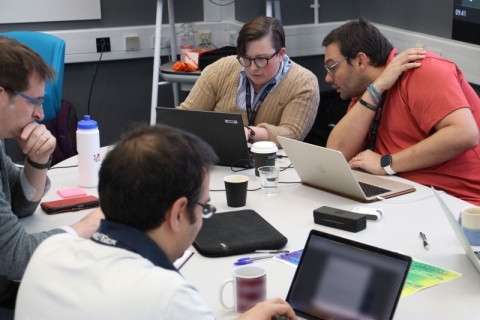A unique new mission design service, inspired by NASA JPL, has won £100k funding from the UK Space Agency for its set-up phase at the University of Portsmouth.
The 'Space Mission Incubator' will allow scientists to come up with an initial concept for a space mission and see it through to a full mission design.
The service will unite scientists, researchers and industry experts in order to speed up the development of space missions, and give academic-based teams access to the type of heritage and expertise that is crucial to early-stage mission design, but can be hard to come by outside of industry.
The service will also diversify the space mission concepts conceived in the UK, including small satellites in orbit around the Moon, designing new space telescopes and space-based solutions to climate change and biodiversity challenges. This diverse mission pipeline, with an increased number of UK mission Principal Investigators, is a key objective of the UK's National Space Strategy.

Scientists and industry experts work together in the new Space Mission Incubator facility during its pilot project
Professor Adam Amara, Director of the University's Institute of Gravitation and Cosmology (ICG), said: "We want to realise the ambitions of the UK Space Strategy and make the UK a leading space nation, and one of the ways we can do this is by lowering the barrier of access to space, so anybody can access a mission design service.
"And what's unique about this service is it's going to be more than just a facility; it's a service which will supply the most appropriate team of experts from diverse science and engineering backgrounds who will help accelerate the early stage of mission design from several months to weeks."
The service will be hosted at a brand new concurrent design facility (CDF), which allows experts from different disciplines to work together on ideas for future space missions. The facility is equipped with a network of computers, multimedia devices and software tools for teams of experts to work closely.
Dr Lucinda King, Space Projects Manager at the ICG, said: "The concurrent design facility has been built in our Dennis Sciama building and it looks impressive. There is state-of-the-art equipment alongside the all-important whiteboards!
"The facility will allow scientists and industry experts to work in the same place at the same time and quickly assess whether a mission is feasible. We have been fortunate enough to be guided by experts at NASA JPL's Mission Formulation Office, who pioneered these types of studies for space mission design.
"Space missions are complex and require a huge amount of expertise. We're excited to be able to offer this expertise when someone has an initial idea and hope the service will shape that idea and allow scientists to have a robust mission design within a matter of weeks."
The facility will allow scientists and industry experts to work in the same place at the same time and quickly assess whether a mission is feasible. We have been fortunate enough to be guided by experts at NASA JPL's Mission Formulation Office, who pioneered these types of studies for space mission design.
Dr Lucinda King, Space Projects Manager
Initially the primary clients of the service will be academics and teams of researchers from across the UK who have an idea for a space mission to address their science goals, but without the experience to transform this idea into a mission design.
Dr King added: "We will help them navigate this first step on the path to designing and leading a mission, and also support them with the next steps, such as where to seek further funding. In the future as the service becomes more established, clients could also include small companies who don't want to maintain the necessary expertise in-house, and start-ups who want to test the feasibility of a concept before seeking venture capital funding.
"We would also like to expand to offer the service internationally, for example to small ESA Member States who don't have well-established mission design capability. We'll also use the Mission Incubator as a training tool for our students, who are preparing to become the next generation of space engineers."
The service and facility are all part of the Portsmouth Research Institute for Space Missions (PRISM), which is focused on connecting academia and industry to make the UK a great space nation.






